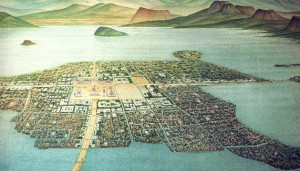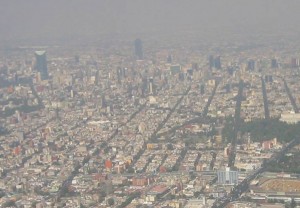- Attached to the essay "A Matter of Time"
Apocalypse now: Mexico City today and our level of concern
Posted December 20, 2011 7:47 pm For the contemplation of impending disaster, one could not find a better place than modern Mexico City. The city, now the largest in the world, is suffering all the plagues of 21th century urbanization run amok. The sight that stunned the conquistadors — a verdant valley sheltering a crystal lake in which floated a magnificent city—is long gone. The lake has been drained, the trees felled, the entire valley paved over, built up, and surrounded by shantytowns without sewage systems or clean water. Fifty years ago, the air was so clear that the snow-topped, twin volcanoes 50 miles away were clearly visible. Today the megalopolis is blanketed in smog, dead birds drop out of the clouds of pollution, and the newspapers
For the contemplation of impending disaster, one could not find a better place than modern Mexico City. The city, now the largest in the world, is suffering all the plagues of 21th century urbanization run amok. The sight that stunned the conquistadors — a verdant valley sheltering a crystal lake in which floated a magnificent city—is long gone. The lake has been drained, the trees felled, the entire valley paved over, built up, and surrounded by shantytowns without sewage systems or clean water. Fifty years ago, the air was so clear that the snow-topped, twin volcanoes 50 miles away were clearly visible. Today the megalopolis is blanketed in smog, dead birds drop out of the clouds of pollution, and the newspapers  report levels of air quality along with the weather. Merely breathing the air is said to be the equivalent of smoking two packs of cigarettes a day. Traffic has become a screeching, swerving motorized stampede. Unable to support the strain of the exploding population and its drain on the water table, the city is sinking in many areas, its sidewalks collapsing onto cracking underground pipes. Yet population growth remains unabated as the poor from other parts of Mexico continue to pour in.
report levels of air quality along with the weather. Merely breathing the air is said to be the equivalent of smoking two packs of cigarettes a day. Traffic has become a screeching, swerving motorized stampede. Unable to support the strain of the exploding population and its drain on the water table, the city is sinking in many areas, its sidewalks collapsing onto cracking underground pipes. Yet population growth remains unabated as the poor from other parts of Mexico continue to pour in.
Meanwhile, concern about climate change and the environment is diminishing as the problems worsen. A recent Reuters poll, from January 2010, found the top five issues of concern in the USA to be the economy, jobs, terrorism, social security, and education. The environment didn’t even make the list. Furthermore, a March 2011 Gallup poll showed that Americans are now putting economic growth before environmental protection by the widest margin since the question was first asked in 1984. Even more depressing, according to another March 2011 Gallup poll, a plurality of 43% think the media exaggerates the seriousness of climate change, while the number of Americans who are worried about it has fallen to 1998 levels, from 66% in 2008, when Gore won the Nobel Peace Prize for raising world consciousness on the subject, to 51% today. Certainly, the bad economy is a huge factor in moving concern from what seems like a distant problem to one that may be more personally pressing, but there have been other bad times in the last 28 years. Is the disinformation campaign working?
topics: nature
share
 site feed
site feed
End of the World Panics
I thought that only American new-agey types were falling for the so-called Mayan Armageddon prediction, but it seems that the frenzy has jumped to the ...
Are we hard-wired for optimism?
This posting about a new book, "The Optimism Bias," by Tali Sharot, appeared on BrainPickings.com, February 26, 2012. The book argues that optimism is an ...


